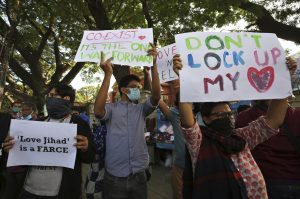Catholic Bishop Mar Joseph Kallarangatt’s remarks that youth from non-Muslim faiths are falling prey to “narcotics jihad” has stirred controversy in the southern Indian state of Kerala.
“Various types of drugs are being used in ice-cream parlours, hotels and juice corners run by hardcore jihadis,” Kallarangatt said in his sermon to devotees at Marth Mariam Pilgrim Church in Kerala’s Kottayam district on September 10, adding that “they are using various types of drugs as a weapon to spoil non-Muslims.”
“Narcotics jihad is the activity of spoiling the life of non-Muslims, particularly youths, by making them addicted to drugs,” the bishop said.
Kallarangatt also referred to “love jihad” – a conspiracy theory that has been widely peddled by Hindutva activists but also endorsed by Catholic and Protestant clergy in India, according to which Muslim men are allegedly luring non-Muslim women into marriage and forcing them to convert to Islam. The bishop claimed that non-Muslim girls, especially from the Christian community, are being converted “after trapping them in love, exploiting and misusing them for destructive activities like terrorism.”
The bishop’s controversial claims evoked an array of responses.
The Bharatiya Janata Party (BJP), which has been at the forefront of accusing Muslim men of waging a “love jihad” against Hindu women, jumped at the opportunity arising from Kallarangatt’s claims. Its leaders rushed to meet the bishop to express solidarity and accused the ruling Left Front government and the Congress party of “supporting extremist forces.”
Brushing aside the unsubstantiated allegations, Kerala’s Chief Minister Pinarayi Vijayan said that it was the first time he had heard of “narcotic jihad.” The issue of narcotics is an “anti-social” matter and not a religious issue, Vijayan said. He cautioned those in positions of power to refrain from making divisive statements.
Kerala has generally voted either for the Congress or the Communist parties. The BJP has virtually no presence in the state. The party has been trying desperately to gain a toe-hold among voters. It has been trying to attract the votes of Christians, who make up 18 percent of the state’s population, and is wooing the Christian clergy. This incentivization has led to Catholic and Protestant priests echoing the anti-Muslim positions of the Hindu nationalist BJP. Heading one of the biggest Catholic churches in Kerala, Kallarangatt exercises massive clout within the realm of the church.
Kallarangatt heads the same Syro-Malabar Church, which released a statement in 2020 claiming that Christian girls were being “targeted and killed” in the name of “love jihad.”
But the same year, the BJP government admitted in parliament that “no such case of ‘Love Jihad’ has been reported by any of the central [investigative] agencies.”
The term “love jihad” was initially created to explain the case of identity theft that happened with Tara Sahdev, the national-level air rifle shooter in 2014, when she alleged that her husband Raqibul Hassan, alias Ranjit Kohli, had pressured her to change her religion.
The term was adopted by Hindutva organizations to harass interfaith couples, particularly Hindu-Muslim couples, on the grounds that the Hindu partner is often “forced” to convert to Islam, which is seen as a ploy to increase India’s Muslim population.
Although Hadiya chose to convert to Islam of her own volition to marry a Muslim, Hindutva activists accused her husband of waging a “love jihad.” After using this term to discredit Hindu-Muslim marriages in the country, the word “jihad” is being routinely added as a suffix by right-wing propagandists to stir anti-Muslim and Islamophobic sentiments in a country where 14 percent of the population is Muslim. They have floated terms like “Corona jihad,” “Land jihad,” “population jihad,” “economic jihad,” “history jihad” and “media jihad” to name a few. To this long list of concocted terms that reek of Islamophobia, Kallarangatt has added another: “narcotics jihad.”
However, Kallarangatt did not stop here. He has stirred controversy again by writing an article on how “pseudo-secularism will destroy India” in Deepika, the church’s official mouthpiece. This will endear him even more to the BJP.
Kallarangatt has conveniently forgotten that since the BJP came to power in 2014, incidents of vandalism and desecration of churches have increased manifold in India. The mobs responsible for the attacks on churches have often belonged to groups that pledge their allegiance to organizations affiliated with the BJP.
As recently as October 3, over 200 unidentified men and women, allegedly belonging to local right-wing groups, vandalized a church in Uttarakhand’s Roorkee in northern India. The violent mob injured several people who had assembled for morning prayers. Even after a complaint being filed with Uttarakhand Police, no arrests have been made yet.
Kallarangatt’s aligning with the BJP could prove costly to his own community.

































